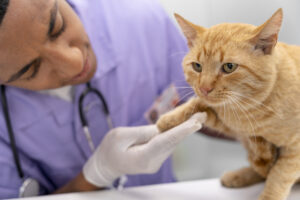What Are Cat Antibiotics?
Cat’s Antibiotic are medications designed to treat bacterial infections like not viral, fungal, or parasitic conditions. They specifically target harmful bacteria inside the body and this makes them a critical tool in feline medicine for cats.

How Antibiotics Work in Cat’s
- Destroying bacteria: many ‘antibiotics’ break down bacterial cell walls, causing them to burst.
- Stopping growth: and others prevent bacteria from reproducing.
- Blocking protein or DNA production: certain ‘antibiotics’ stop bacteria from making proteins or copying their DNA.
That’s procedure, whether by killing bacteria directly or stopping them from multiplying, gives your cat’s immune system the upper hand.
When Do Cat’s Need Antibiotics?
Veterinarians prescribe ‘feline antibiotics’ when there’s a strong confirmation of a bacterial infection. Common conditions include:
- Cats have urinary tract infection antibiotics.
- Skin infections or abscesses that are often caused by cat bites.
- Dental infections like gum disease, tooth abscesses.
- Respiratory infections (including ‘cat upper respiratory infections’).
- Surgical or psost surgical some wound healing.
Note: ‘antibiotics’ would not help us with viral infections such as feline herpesvirus or calicivirus supportive care like hydration, nutrition, and rest is usually recommended in those pet cat cases.
Risks of Misusing Antibiotics in Cats
While cat antibiotics can be life healthy and saving, misuse is dangerous includes:
- Resistence of Antibiotic in pets: overdose or overuse makes bacteria harder to treat later.
- Pet Toxicity: certain human antibiotics are unsafe for cats.
- Cat Digestive upset: like diarrhea, vomiting, or appetite loss may occur.
- Allergic situations: although it is rare but, they are possible.
Do not give your cat leftover ‘human antibiotics’ or medications prescribed for another pet always consult a vet first.
Safe Antibiotics for Cats
We have some commonly prescribed and generally ‘safe antibiotics for cats with infections’ used by veterinarians:
-
Amoxicillin
The most widely used ‘antibiotics for cats’ effective for urinary tract infections, skin infections, and respiratory illnesses in cat health.
- Form like tablets, capsules, or liquid.
- Side effects are mild digestive upset but rarely serious.
- Search “amoxicillin dosage for cats.”
-
Amoxicillin Clavulanic Acid (Clavamox)
A best as well as stronger version of amoxicillin, it has clavulanic acid, which fights inner resistant bacteria. Common uses include wounds, abscesses, and dental infections.
-
Clindamycin
Highly more effective for dental infections, abscesses, and bone issues; often prescribed as ‘clindamycin for cats dental infections’.
-
Doxycycline
Used for respiratory infections in cats; also works against tick-borne diseases.
Special note: always follow with water or food (to reduce throat irritation).
-
Cephalexin
A cephalosporin antibiotic prescribed for skin and soft tissue infections; however, some cats may be more sensitive.
-
Metronidazole
It works against certain gastrointestinal infections and also bacterial overgrowth. Because overdose can cause neurological effects, dosing must be precise of cats.
Tips for Giving Antibiotics to Cats Safely
Many owners ask: “How to give antibiotics to cats safely?”
Here are some tips:
- Follow your pet’s dosage exactly never skip or stop early.
- Not to crush pills unless advised it may reduce effectiveness.
- Watch the side effects like vomiting, diarrhea, drooling, swelling.
- Avoid sharing medications to others one cat’s prescription is not safe for another.
- Store properly that keep antibiotics in a cool, dry place, away from children and pets.
Natural Immunity and Alternatives
Some pet owners search for “natural alternatives to antibiotics for cats”
While good care Like hydrati on, nutrition, reduced stress can help recovery, these should never replace pet prescribed medication when a bacterial infection is confirmed. Natural remedies can, however, complement treatment of pets.
FAQs
Q: Can cats take antibiotics without a prescription?
A:No, over-the-counter antibiotics for cats
are unsafe without veterinary approval.
Q: What happens if I stop antibiotics early?
A: The infection may return; worse, bacteria may become resistant.
Q: Are there safe over-the-counter antibiotics for cats?
A: None are considered safe without guidance that consult your veterinarian first.
Conclusion
- Cat Antibiotics are essential in treating bacterial infections like urinary tract infections, abscesses, dental issues, and respiratory illnesses of it.
- Cat Safe Antibiotics include amoxicillin, clavamox, clindamycin, doxycycline, cephalexin, and metronidazole but only when prescribed by a veterinarian is very important.
- Also human Antibiotics without professional advice is dangerous sometimes deadly, always follow your vet’s instructions, complete the treatment course, and never self-medicate your pet.
- Cats Antibiotics is work along with the risks, safe options, and proper usage you can protect your feline friend’s health and ensure a safe, speedy recovery of health.
